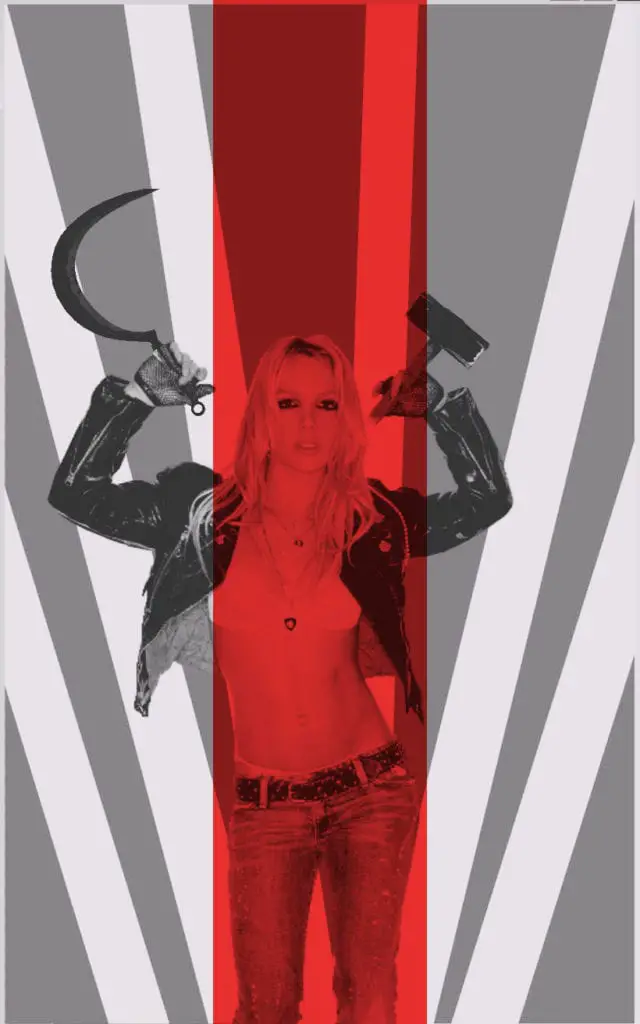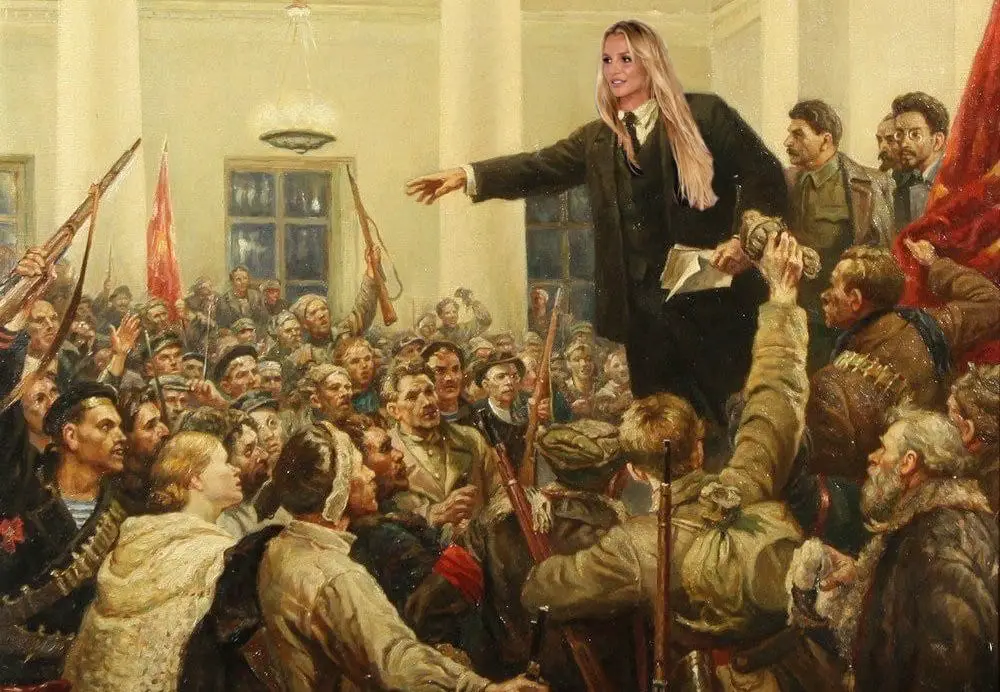There is a specter haunting pop music. The specter of communism.- Karl Marx (probably)
We live in a dark and confusing time. Income inequality is higher than ever, a pandemic stalks the land and keeps us stuck at home, and our leaders are seemingly incapable of doing anything. But there is a light in the darkness. A hero has emerged to lead us into the glorious future: Britney Spears. Earlier this week, Britney posted an interesting image to her official Instagram.
https://www.instagram.com/p/B-FppKxAFxm/?utm_source=ig_web_copy_link
In it, she quotes Mimi Zhu, an Australian artist and writer living in Brooklyn who strongly ID’s as a socialist. In an interview with Paper Magazine, Zhu said that her original post was written
“…because we are in such a time of confusion, disconnect…To talk about togetherness, and to talk about how we are going to cope with all the ongoing shifts. At least in New York, all of my friends got pretty much laid off [due to coronavirus shutdowns]. A lot of people are stressing about rent, basic necessities, and how to live and just kind of carrying all that.”
For Zhu and many people online, leftist or otherwise, the post came out of (ahem) left field. Britney has always been a feminist and songs like “Lucky,” “Toxic,” and “Work Bitch” have all been reexamined in recent years for meaning under the surface. “Work, Bitch,” was also referenced in a famous piece of satire by British site The Daily Mash, which framed Spears as a Marxist who consciously wrote the dance-pop hit as a representation of the labor theory of value (more on that later). And in the wake of Spears’s post, similar jokes have been made about her other songs, such as “Toxic” being about fracking or “3” being about the dangers of the American two party system. Even Briahna Gray, National Press Secretary for Bernie Sanders, got in on the jokes:
“Lucky” was about the myth of meritocracy under unfettered capitalism. https://t.co/5J7FDQ3BpN
— Briahna Joy Gray (@briebriejoy) March 25, 2020
Now, this article was originally going to be in a similar vein to the above. I was going to find some Britney songs, apply overly-complex Marxist theory to them, and have a fun tongue-in-cheek article. But as I (and fellow Fandomentals editor Kori) found out while digging, most of the songs being memed weren’t written by Britney Spears. Now, obviously most pop music is created by massive teams of creatives with the amount of input by the star varying from case to case. But once I started looking into the songs that credit Spears as a co-writer, a pattern started to emerge. A pattern that, when taken alongside her many real life struggles with control over her own work, art, and life, show that Britney Spears may have been a leftist all along.
I’m A Slave 4 Capital

Britney’s first songwriting credits appear not on her debut …Baby One More Time (1999) nor its follow up Oops! I Did It Again (2000), but on her third album Britney, released in 2001. At the time, Spears was 19 and arguably the biggest pop star in the world. In many ways, the new album was a way for her to assert her independence after over 10 years of being packaged and produced by everyone from her mother to the Walt Disney Corporation. Even the title shows her desire for a more personal album than the ones that came before, which is reflected in her six songwriting credits, half of the record. Three of those stand out in particular: “Lonely,” a song where the singer leaves a manipulative partner, “Cinderella,” a song where the singer leaves after being unappreciated in her relationship, and “Let Me Be,” a song where Spears asserts her independence and need to make her own choices. In all three, Spears is clearly placing herself in opposition to some “other,” who is controlling and using her in some way. She is fed up and, in the case of the first two, leaving the one (implied to be a man) controlling her as she makes her own way to find someone who will treat her right (which she does in “That’s Where You Take Me”).
Now, I’m not going to pretend that these tracks are explicitly framing “capital” or “bosses” or something like that. But what I will say is that there’s something already showing its effects on Spears even at what was probably the apex of her career: alienation. In a broad sense (incredibly broad, because you’d fall asleep if I went to as much detail as it would probably need and you don’t have time for that), alienation is the idea that when a subject and an object (or a self and other) are separated it can be problematic. In a traditional Marxist sense, this is applied to workers and their labor, especially the full value of it. When they are denied control of their labor, when they’re used to only generate value for other people, they lose their sense of self. They feel that they have no control over their lives, which as fully actualized and thinking people (not robots), creates an awful dissonance. Even a popstar can feel this, having reached the top of her game but still feeling controlled and packaged by everyone around her and criticized for any attempts to break out of her mold.
Me Against The Bourgeoisie

Seize The Means of Work, Bitch

Britney Jean, released in 2012, was a roaring return for Spears as a songwriter. Not only did she mirror her first personal album, Britney, in the title, she also made many of the implicit themes of that album explicit in what she called a concept album on the loneliness of pop life. We still see her grappling with her need for control (even becoming more self-aware of it in “Passenger”) and her positioning herself as the dominant half of her relationships. And, of course, it gave us “Work Bitch.”
Again, this song isn’t a magnum opus of Marxist theory (the entire joke of it being one is that it’s basically just a few lines over a beat that happens to mention work), but when placed alongside all of her other work shows her relationship with her own fame and fortune. What on its face seems like a pump up, kick-ass, get that bread song, in context becomes a deeply cynical and rather dark anthem of corporate greed that wouldn’t be out of place on Pink Floyd’s Wish You Were Here. The song, and especially the music video, is not really from her point of view, and once could argue that she’s not even singing as herself. Instead, she’s taking on the role of the music industry, the seductive yet violent taskmaster who whips you, berates you, and degrades you while reminding you that you have to work, bitch if you want to achieve your dreams. And even if you do take all that abuse, you might still lose it. It isn’t a perfect distillation of Marx, but it is a perfect distillation of Britney’s alienation that, after nearly 20 years, she is still dealing with.
#FreeBritney

I’m getting a little long here, but there’s actually a point to all this. As of right now, Britney Spears is, for all intents and purposes, not a person. Despite the fact that her father’s conservatorship was supposed to end in 2009 after the Circus tour, it has remained in place and seems to be meant to be permanent. Not only that, but Spears has pulled out of a Vegas residency and re-entered psychiatric care, with some like the Britney’s Gram podcast alleging that Britney’s problems stem from her father’s complete control over her and her children. She’s been on a work hiatus since 2018, with many saying that she’s essentially on strike against her father. It’s important that left-wing people of all stripes read up about Britney’s case beyond just the memes, because she’s not just some rich person LARPing. As American organizer “Big Bill” Haywood once said: “I’ve never read Marx’s Capital, but I’ve got the marks of capital all over my body.”
Britney’s a fellow worker, trying to get the actual value of her labor that’s been sucked away by the powerful. So it’s no wonder she’s sympathetic to leftism, or even an outright socialist. Don’t let the jokes get in the way of the real exploitation that’s happened, or that happens to musicians throughout the industry.
Solidarity Forever
And Work, Bitch

